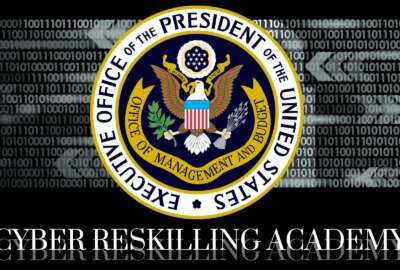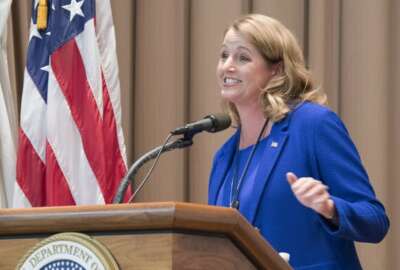

The Trump administration said it sees 2019 as the year it plans to win the public's trust and establish familiarity with the federal workforce that it's up to t...
While the Trump administration spent much of 2018 writing new policies and codifying its priorities, 2019 will be focused on fostering trust with both American citizens and the federal workforce that agencies are up to the challenge of deploying and retooling government for the new world of artificial intelligence, automation and analytics, Suzette Kent, federal chief information officer, said Monday.
At first glance, the federal workforce seems to be game.
The Office of Management and Budget said it’s so pleased with the response it received from federal employees who had applied to be a part of the first Federal Cyber Reskilling Academy cohort, that it may expand its plans for the program in the coming months.
OMB set a goal of finding 25 federal employees who don’t have an IT background to join the first class of the Federal Cyber Reskilling Academy, which the administration first announced back in November.
More than 1,500 federal employees applied to the program, Kent said last week. Applicants received links to an online assessment from in February, and the assessment period ended Friday.
So far, the results are promising.
“Even in some of the early returns … we have a high number of individuals who are actually qualifying in the success range,” Kent told reporters Monday after a speech at the ServiceNow Federal Summit in Washington.
Kent said applicants who post certain scores on the academy’s initial assessments have a strong aptitude for the end goal of becoming a cyber defense analyst for another federal agency.
OMB plans to review, score, interview and select applicants by April 1. Training will run from mid-April to mid-July.
Some agencies already expressed an interest in taking on graduates of the Federal Cyber Reskilling Academy, Kent said. These graduates will be full-time employees of these agencies, not just detailed to a temporary appointment at a new agency.
Kent said she hopes agencies will see the success from the first cohort — both in terms of how many people applied for the program and how they eventually perform in their new jobs — and will be inspired to encourage more of their employees to apply for the second round.
“Hopefully [we’]] see more support across agencies when they see the great outcomes at other venues we can make the next cohort even larger than we originally planned, because we had a bigger response than we expected and we’re seeing great scores,” she said. “When we went into it, it was an experiment, and it’s an experiment right now that’s going extremely well.”
Kent said she’s looking for employees who have promising research and analytics skills — as well as the curiosity and the aptitude to follow and track certain kinds of patterns. Librarians, paralegals and those in similar professions have been known to have skills that are transferable to cyber defense positions, she said.
More than half of the academy’s applicants were employees at General Schedule levels 5 through 11, which Kent said, in a sense, is the sweet spot within the federal workforce where experts believe they can successfully teach and retrain workers to take on new kinds of work.
“If we can self-source with people who are already inside the federal government, they already have proper security clearances, they come with some level of subject matter knowledge and we don’t have to go through that whole external search process, it’s a win-win-win across the board for the employee, for the agencies and then the federal workforce,” she said.
OMB has plans to open up another cohort of the reskilling academy to IT federal employees later this year. Kent said the agency may expand its plans for future cohorts based on initial successes of the first. OMB is considering a program geared toward higher-level employees, she added.
The reskilling academy is just part of the administration’s efforts to build trust with the federal workforce and grow familiarity with new technology.
“We have to foster public trust and confidence in how we’re applying analytics, automation, natural language processing and artificial intelligence,” Kent said at the ServiceNow summit. “Over the next few months we’re going to be very focused on how we use those automated technologies in the federal government. The evidence of that work is going to be seen in the strategies and policies that you’ll continue to see from OMB, OSTP, the Department of Defense, the intelligence community and every agency.”
The administration’s approach this year will build off the steps it took in 2018 to make good on cross-agency priority goals in the President’s Management Agenda. OMB spent much of the past year announcing new policies and collecting public comments, Kent said.
“That’s just a part of that, that just gets the barriers out of the way,” she said. “We have to continue to lower the barriers for agencies to continually adopt the capabilities you’re going to be talking about today, particularly how we deploy and integrated automation across workflow and business processes, whether they’re in the back offices with the chief financial officer or they’re embedded in how we serve our customers.”
Beyond the reskilling academy, the Trump administration set up a new artificial intelligence task force, expanded direct-hire authorities for certain IT positions and updated a Trusted Internet Connections (TIC) initiative draft policy, among other moves.
“We have to just get started,” Kent said. “We have a few agencies that are already in this journey, but not everyone, and in some places there’s questions. What we’re doing for this year is putting some guard rails in place, defining clearly the automated technologies that we want to focus on, categorizing by how they how help assist in repetitive tasks, how they augment our decision making and in what cases we’re comfortable with suggested decisions from technology.”
Some agencies, of course, are already earning practice with these new technologies.
The Pentagon has started using bots to sift through layers and layers of military data to help answer hundreds of data requests and questions that come from DoD auditors, said David Bennett, chief information officer and director of operations for the Defense Information Systems Agency.
DoD’s Joint Artificial Intelligence Center, which the Pentagon launched earlier last year, is collaborating with the Office of the Director of National Intelligence to codify a series of ethics principles for agency-use of AI, said Stoney Trent, the center’s chief of operations.
Copyright © 2024 Federal News Network. All rights reserved. This website is not intended for users located within the European Economic Area.
Nicole Ogrysko is a reporter for Federal News Network focusing on the federal workforce and federal pay and benefits.
Follow @nogryskoWFED


